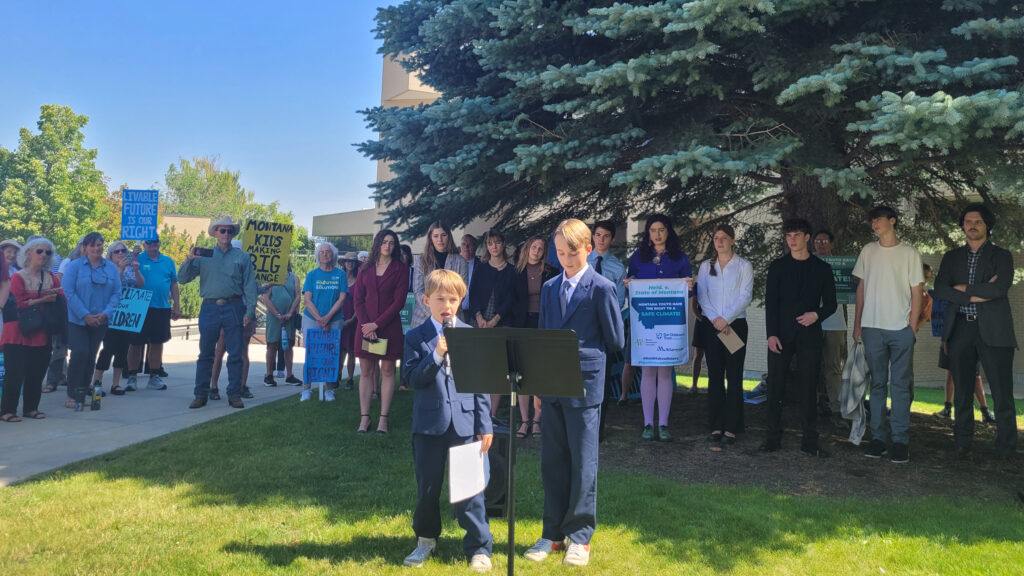A landmark climate change lawsuit reached Montana’s Supreme Court on Wednesday, with the justices hearing arguments that a state law promoting fossil fuel development violated Montanans’ constitutional rights.
The case was heard in a Helena courtroom filled with spectators, as outside temperatures neared 100 degrees.
The appeal involves a decision from last year when a Montana judge blocked a state law that prohibited agencies from considering climate impacts when approving fossil fuel projects. The ruling by District Judge Kathy Seeley followed a lawsuit filed by 16 youths arguing that the law violated Montana’s constitutional right to a “clean and healthful environment.”
It was the first U.S. ruling to effectively establish constitutional rights to a stable climate, said Patrick Parenteau, professor of law emeritus and senior fellow for climate policy at Vermont Law and Graduate School.
“That’s historic,” Parenteau said. “That’s a breakthrough.”
Youth plaintiffs have filed similar cases in other states and federally, supported by the nonprofit Our Children’s Trust, but many have been dismissed or are still pending. Recently, Hawaii Gov. Josh Green announced a settlement with youths who sued that state, with the government agreeing to cut climate pollution.

At the hearing in Montana, a lawyer for the plaintiffs stated that “this case is about Montana’s climate, Montana’s constitution and Montana’s children.” Roger Sullivan noted that the state had never denied a fossil fuel permit, adding, “We are in a climate emergency, and additional greenhouse gas emissions will cause additional heating and additional injuries to plaintiffs.”
Lawyers for the state did not dispute the science of climate change or the role of fossil fuels but argued that a state district judge in Montana could not influence the problem.

The audience sometimes applauded the plaintiffs’ arguments while booing the state’s attorneys when they questioned Montana’s ability to phase out fossil fuels.
State lawyers argued that Montana’s climate pollution is insignificant globally, and the court cannot issue a ruling that addresses the plaintiffs’ harms from extreme weather. Much of the hearing focused on whether the lawsuit should have proceeded without challenging a specific permit.
Several justices appeared skeptical of the state’s arguments, calling them “circular.” Michael Gerrard, faculty director of the Sabin Center for Climate Change Law at Columbia University, said the ruling’s impact would extend beyond Montana’s borders.
“The case is being closely followed around the world and is being cited in cases in jurisdictions inside and outside the U.S.,” Gerrard said.
Parenteau said the case’s importance is heightened by recent rulings by the U.S. Supreme Court that could limit federal regulation of climate pollution.
“Any environmental case that gets to the Supreme Court is dead on arrival,” Parenteau said. “That’s why people are going to the states.”
Our Children’s Trust is pursuing similar cases in other states. Many cities, counties, and states are filing climate liability lawsuits against oil companies in state courts.

“We feel seen by this case,” said Isabel Shaida, a member of the national Sunrise Movement advocating for climate action. “Young people are acutely aware that our degrading environment is affecting our day-to-day lives.”
After the hearing, plaintiff Grace Gibson-Snyder, originally from Missoula, said the case could help the state’s low-income residents and fossil fuel workers trapped in an outdated system.
“This does not have to be a fight,” Gibson-Snyder said. “You’re arguing this case on legal technicalities, claiming our efforts won’t make a difference. This is an evasion of responsibility and neglect of your constitutional duty to protect our rights and our state. Why would you not try?”
Original Story at insideclimatenews.org
